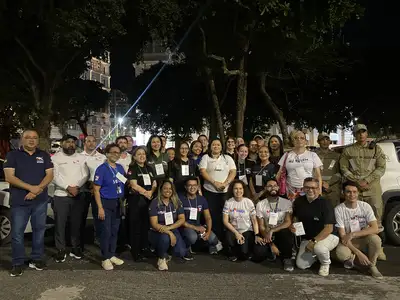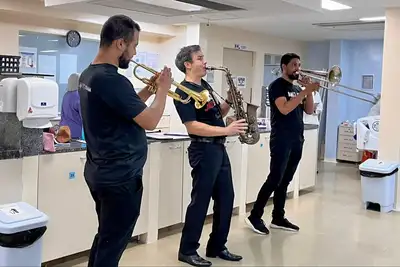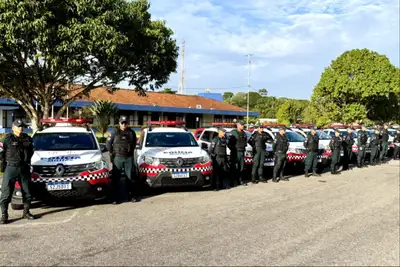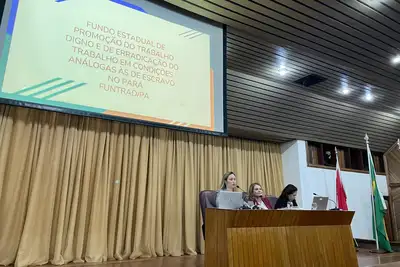Cametá hosts the first Caravan of Sanitary Education on Cassava Witch Broom
Joint action, which involves more than 50 professionals from various states, shares information so that rural communities can help prevent the pest
More than 50 technicians from institutions related to agricultural defense, rural extension, agriculture, education, and research are participating this week in Cametá, a municipality in the Tocantins Integration Region, in the I Caravan of Sanitary Education on Cassava Witch Broom.
The event was opened on the morning of this Tuesday (26), at the auditorium of the Federal Institute of Pará (IFPA), Campus Cametá, and was attended by the Secretary of State for Family Agriculture, Cássio Pereira; the federal agricultural auditor from the Department of Plant Health and Agricultural Inputs (DSV), of the Ministry of Agriculture and Livestock (Mapa), Glauco Teixeira; the coordinator of the National Program of Sanitary Education in Agricultural Defense (Proesa), Juliana do Amaral Moreira; the director of Plant Defense and Inspection of the Agricultural Defense Agency of Pará (Adepará), Lucionila Pimentel; the Plant Defense manager, Rafael Haber; the Plant Inspection manager, Joselena Tavares; the state agricultural inspector from the Quarantine Pest Management, Thais Leão, and local authorities.

Carried out in partnership by the Ministry of Agriculture and Livestock, Federal Superintendence of Agriculture in Pará (SFA/PA), and Adepará, the educational action aims to strengthen sanitary education actions and train technicians for the prevention and control of the pest in communities that depend on the cassava chain in Pará, the largest national producer of the root.
"The Caravan aims to raise awareness among producers, technicians, community leaders, students, and society in general to prevent the spread of the pest to the cassava-producing regions of the State, in addition to coordinating inter-institutional efforts to reinforce phytosanitary surveillance," explained Andreza Tomé, federal agricultural auditor of Mapa.
Dynamics - In addition to training technicians on specific topics about the disease, there will be training of multipliers in rural communities. In the dynamics involving producers, educators, and community health agents, active methodologies such as dramatization, conversation circles, gamification, among other resources, will be used to pass on knowledge about the pest.
The activities will be coordinated by the National Program of Sanitary Education in Agricultural Defense, of the Ministry of Agriculture and Livestock, which integrates the Unified System of Agricultural Sanitary Attention (Suasa), and aims to train people and organizations to improve sanitary conditions through educational actions and articulation among different institutions.
Consequences - Cassava is essential for the economy and food security of Pará, with an annual production of 4 million tons. The arrival of the pest could cause significant losses, affecting small producers and indigenous communities that depend on cassava for their livelihood.
The cassava witch broom is caused by the fungus Ceratobasidium theobromae. The disease earned this name because it causes stunting and proliferation of weak and thin shoots on the stems, resembling an old broom.
The pest was first identified in indigenous villages in Oiapoque, Amapá, and represents a serious threat to cassava cultivation in the North region. Since then, strategic measures have been implemented to prevent the spread of the fungus.

Combat - At the national level, the Ministry of Agriculture and Livestock created a prevention and control program to combat the disease and declared a phytosanitary emergency with measures such as quarantine and control of the movement of plant material.
Adepará conducts constant monitoring of cultivation areas and has already published an ordinance prohibiting the entry of plants or plant parts from affected areas. In addition, agricultural defense technicians from Pará have been trained to identify the pest and apply phytosanitary measures.
"The agricultural inspectors and agronomists from Adepará participated in training in Amapá, learning to identify symptoms of the pest and methods of sample collection. They also work on raising awareness among producers, sharing information on prevention and control. We are trained and can pass this knowledge on to other technical teams, so that more people can act in the prevention of this disease," emphasized Maria Alice Thomaz, manager of Quarantine Pests at Adepará.
Partnerships - The I Caravan of Sanitary Education on the Cassava Witch Broom has the support of the City Hall of Cametá, through the Municipal Secretariat of Agriculture, Rural and Economic Development (Semadre), Executive Commission of the Cocoa Crop Plan (Ceplac), Federal Institute of Pará (IFPA), Federation of Agriculture and Livestock of Pará (Faepa), Brazilian Agricultural Research Corporation (Embrapa), Agriculture Millennium, Pérola de Cametá, and Fábrica da Vida.
In addition to technicians from various locations in Pará, representatives from the Agricultural Defense Agencies of the states of Acre, Amazonas, Amapá, Maranhão, Bahia, Espírito Santo, Piauí, Roraima, Rondônia, and São Paulo are participating.
Service: I Caravan of Sanitary Education on Cassava Witch Broom. From August 26 to 31, in Cametá (PA). From August 28 to 31, there will be activities in schools and rural communities.










